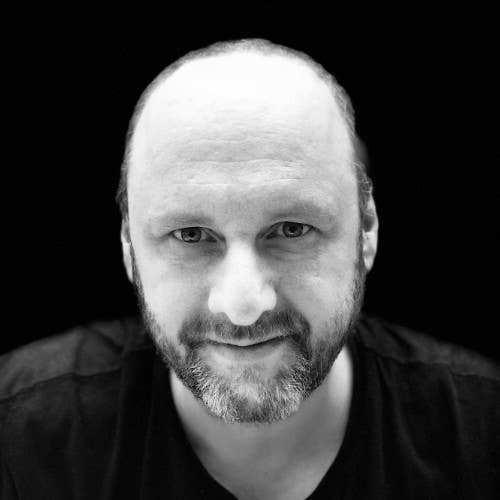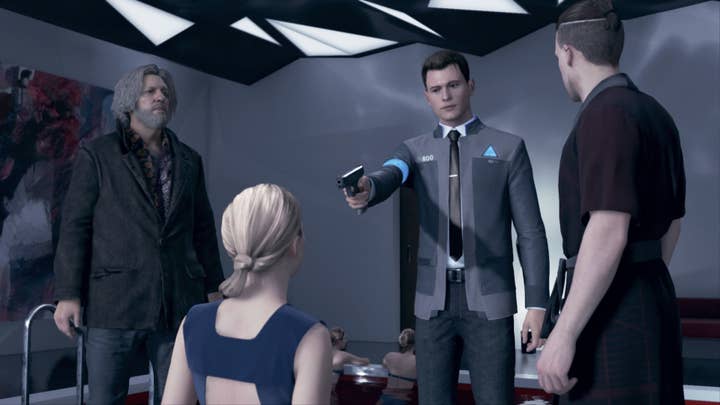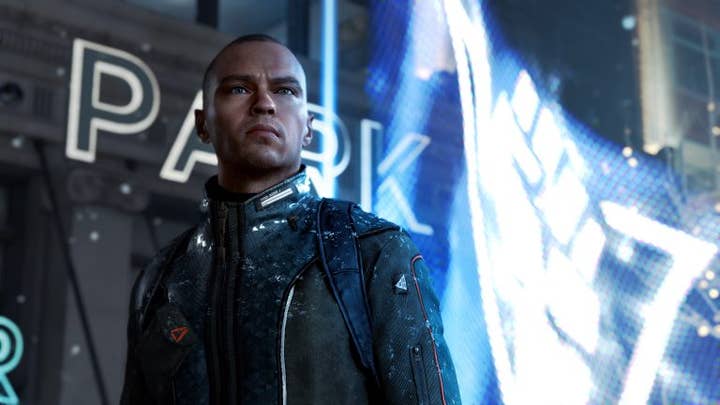Beyond PlayStation 5: Quantic Dream's next-gen, multi-platform vision
NetEase investment will allow Detroit: Become Human studio to target new fans in China and “compete with the best AAA studios”
Perhaps the biggest news from NetEase's investment in Quantic Dream is the fact that it will enable the developer to make multi-platform games for the first time in almost 15 years.
For the last decade and a half, the French studio has been solely devoted to PlayStation platforms, with the release of 2010's Heavy Rain, 2013's Beyond: Two Souls and last year's Detroit: Become Human.
But with Chinese giant NetEase taking a minority stake in the developer, the team finds itself able to broaden both its horizons and audience in preparation for the next generation of games platforms -- not just PlayStation 5, but the next Xbox, high-end PCs and perhaps more.
"We want to port our engine and pipeline to all next gen platforms to be able to compete with the best AAA studios and to integrate new advanced features in our games," co-CEO Guillaume de Fondaumière tells GamesIndustry.biz.
He continues: "We had a fantastic collaboration with Sony for 12 years, and we had all the creative freedom we needed and their trust to develop the games we wanted. The PlayStation community was also incredibly supportive, and we are absolutely thankful to all for these amazing years.
"Now we feel that our games have the potential to reach a wider audience. We want anyone on any platform to have the possibility to enjoy our games. Over the last few years, we've seen the development of the PC market, the emergence of Cloud Play, as well as other platforms, and we want to play an active role in these evolutions within the industry.

Fellow co-CEO David Cage adds: "We are going to work on all platforms and make our experiences available to everyone. Our team developed some of the most advanced engines on PS3 and PS4, and we are now going to make our technology cross-platform and try to get the best out of each.
"We will keep supporting PlayStation of course, but we will also support PC and all other platforms from now on."
Cage goes on to say that this desire to go multi-platform, particularly with a new generation of consoles on the horizon, was part of the motivation behind this partnership with NetEase. As the writer puts it, he and Fondaumière have been "thinking about the studio's future for quite some time."
"We knew the gaming landscape was entering a major transformation phase, with new platforms and new ways of playing games, and we could see the challenges but also the opportunities that would occur," he says.
"We always had contacts with various publishers and investors who appreciated the studio and its games. The success of Detroit: Become Human made the company even more attractive. We were not looking just for project funding, we wanted to find a partner who would understand who we are and allow us the opportunity to grow intelligently, independently, and in full respect of our DNA."
Despite the controversy around claims of a toxic work culture early last year, Quantic Dream remains an acclaimed studio for its unique brand of storytelling and garnered a lot of interest from potential investors. However, Cage reports that NetEase soon became a clear leader as discussions with the Chinese publisher "went particularly smoothly."
"It was important to not let anyone turn us into an 'interactive story assembly line'... We never want to have an accountant telling us what game we should develop"
David Cage, Quantic Dream
"We were very impressed by their organisation and intrigued by some of the previous investments they had made -- such as Bungie or Second Dinner -- and we felt they were carefully cherry-picking the studios they wanted to work with."
Simon Zhu, NetEase's general manager of investment and strategy adds: "Like talking to like-minded friends, soon enough we realized that the skillsets of the two companies are so complementary -- and we really love to get a chance to work together, learn from each other... that we should take a step further into the relationship. Everything happened naturally."
In addition to unlocking the ability to go multi-platform, the NetEase investment has also unlocked the lucrative Asian market for Quantic Dream. Zhu reports that the release of Detroit: Become Human "created quite a buzz in China's livestreaming audience", while Fondaumière admits the studio was "really surprised" by the game's success in Asia and Japan.
With a clear demand for its products, the French studio is now setting its sights on the East to reach a new audience.
"Our games have always enjoyed a positive critical reception in this region, but Detroit is by far our most popular and best-selling game in this part of the world," says Fondaumière. "There is definitely a growing interest for story-driven games in Asia, and we certainly intend to develop our presence there, particularly in China which is now the world's largest market. "Choosing NetEase as our partner was definitely part of a thought-out strategy."
However, Cage has assured that this growing appetite for Quantic Dream's games in Asia will not necessarily dictate the type of games it makes. NetEase will have no influence on the studio's creative decisions -- "And NetEase never asked for anything like this" -- nor will he suddenly start writing stories specifically for an Eastern audience.

To date, all of Quantic Dream's titles -- aside from debut game Omikron: The Nomad Soul -- have been set in the United States, but Cage insists that this is always based on "where the story naturally fits."
"For many years, the US was the world's stage," he explains. "It was some kind of common ground that everyone in the world was familiar with and that looked like a neutral place to tell all stories. Like many creators, I have been fascinated for years by the US, and the iconic images that Hollywood showed me since I was a kid, but also by the social aspects that I progressively discovered.
"Narrative games are still a nascent genre in China, and as developer we are still a beginner in the world of storytelling"
Simon Zhu, NetEase
"Now I believe that the world is changing and I don't think there is still a unique stage where all stories can take place, but there are many stages that are just as interesting.
"As a writer, I never chose a location for my stories based on a marketing brief. My stories take place where I feel they should happen. Detroit was the perfect place for the story of Detroit: Become Human and I will keep having stories taking place in the US if I feel that this is what is working best -- though I am definitely interested in telling stories in different places, like Asia, Paris, or anywhere else."
Regardless of where they're set, Zhu is confident Quantic Dream games will continue to find an audience in his home market. In fact, NetEase's stake in the studio helps offset a slight shortcoming in its portfolio.
"Narrative games are still a nascent genre in China, and as developer we are still a beginner in the world of storytelling," he says. "We do admire Quantic Dream's ability to tell great stories while making players really think -- it is not just industry leading in video game sector, it is also groundbreaking in the culture and entertainment sectors."
He continues: "Look at successful games from Japanese developers -- they work so well in the West because they are great games themselves with great stories and characters that can transcend culture. This is exactly what we are trying to learn now, not just from Quantic Dream, but in general -- storytelling is critical for our game to succeed in the West."
NetEase's investment in Quantic Dream has other benefits for the developer. Cage reports the company is trying to grow its headcount and expand its offices to accommodate more people. It has also reserved a "considerable amount of our capital" from the agreement with NetEase to ensure it can continue sharing royalties with the development team so they will "directly benefit, not only from the success of the titles they worked on, but also from the success of the entire studio."

Most importantly, it enables Quantic Dream to maintain its independence. While it has held strong ties to PlayStation for two console generations, it was never owned or controlled by the platform holder. And in an age of consolidation, with Microsoft (for example) snapping up talented studios left, right and centre, Quantic Dream is determined to keep its options open.
"I started Quantic Dream 22 years ago because no one believed in the game that I dreamed of making," says Cage. "That game became Omikron: The Nomad Soul, and it was the beginning of an incredible journey for the company and myself. We've always made games that are different, believing in emotion and interactive storytelling at a time when it was far from being popular. We have grown to believe in thought-provoking experiences evoking real world issues.
"Because we make games that are unusual and try to explore new grounds, it was important for us to keep control of the company, and not let anyone turn it into an 'interactive story assembly line' in order to generate more profits before closing it down. We never want to have an accountant telling us what game we should develop. We are driven by a passion to make games that are different, and this is what our fans like about us. We felt that staying independent was the best way to stay true to who we are and to keep creating experiences that our fans want.
"We never argued with NetEase about this, because it was something obvious for them from the start as well. They also have a number of highly talented in-house studios operating independently. They don't join us to interfere with or change the company; they are here because they like what we do and they want to help us develop our vision."
Fondaumière agrees, underlining that the investment will "allow us to keep independence in our editorial choices and our strategy as a company, and "to be more ambitious and to explore new directions".
"By becoming the producer of our own games, we will also move up in the value chain, which is also important for us," he says.
Zhu concludes that NetEase has no current plans to absorb Quantic Dream into its global games empire, and is content to "stay as a minority stakeholder as long as it helps."
"We respect our partners' independence and creativity, and will continue to provide support whenever and wherever needed to help realise their growth and vision," he says.

